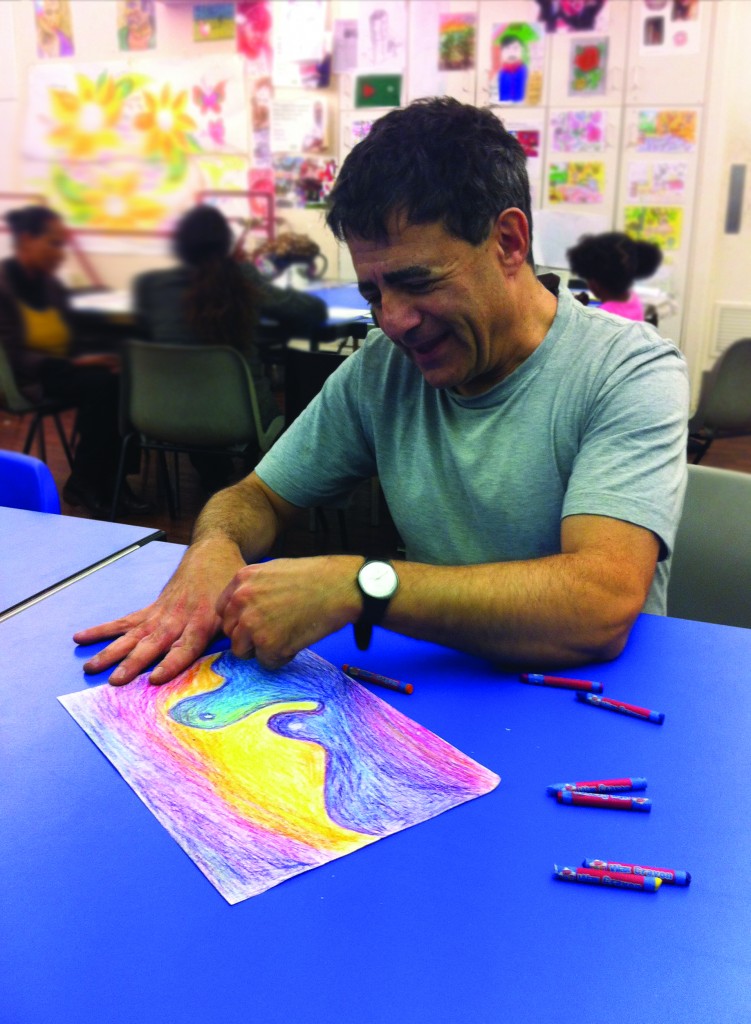
I then attended a local primary school in Edinburgh, where my mother and I moved, and a mainstream secondary school in London when we moved back to England in 1972. Art was my strongest subject (I passed several O Levels) and I studied furnishing design and textiles at the London College of Furniture. I got a diploma in art and design. I took more courses after that at a local art college and learned things like etching and print making. My most recent works are computer generated greetings cards (see the website).
Following a traumatic event in 2008, I developed severe depression and anxiety . After some time attending a psychiatric unit, social services support and help from my GP, a social worker suggested volunteering and I was put in touch with Volunteer Centre Camden.
It was through the volunteer centre that I started working at the Holy Cross Centre Trust in July 2011. It is a secular organisation in King’s Cross, London, which supports mental health recovery as well as homeless people, refugees and asylum seekers.
I hadn’t volunteered before although I’d had some experience of work. The place where I worked previously was a company providing unpaid employment for people with mental health issues and was run as a social service. The aim was to manufacture and distribute large volumes of greeting cards to the mass market but I wasn’t happy there. The tasks I was involved in were printing and packing greeting cards and using Photoshop on a computer for designing cards for later use and batch production.
I did not get satisfaction there as I was mostly restricted to printing other people’s designs and this did not allow me to express my own ideas. Their bias was to produce Christmas cards and my inspiration for designs comes from many sources which are irrelevant for Christmas. The repetitive tasks were soul-destroying.
But at the Holy Cross where I am now, my role is to help and encourage people to draw and paint, also to set up and tidy the art materials. I work noon to 3pm. Everyone is kind and friendly and there is a positive buzz to the place. Not only is helping out so satisfying and rewarding, it helps me to gain significantly in confidence and the thrill of feeling respected and valued as part of a team is fantastically liberating. I have made many friends and can see myself thriving there well in the future.
Suitable volunteering should be open to more autistic people as the skills required such as attention to detail, reliability or some special talents are well suited to the autistic trait and may prove to be great assets for the workplace. On their part autistic people can benefit from mixing and socialising with people of different nationalities and backgrounds and feeling respected and valued. To me the regular routines, the structure to the week and the sense of purpose in society are most satisfying.
Autistic people may encounter some difficulties. For example, travelling on public transport, especially long distances, or unintentional and misinterpreted challenging behaviour may cause problems. But with foresight, awareness about autism, guidance and the right support I see no reason why autistic people should not be accepted and be very successful doing voluntary work. I am quite sure that, giving the right conditions, volunteering can be “autism friendly”.
The fact I am high functioning autistic has presented no problems in my volunteering. One of the benefits of working there is that it has a knock-on effect on my closeness, love and affection towards members of the family. I now feel so optimistic about the future. Socialising now comes with ease. I am thrilled with life!
* See more of David’s work on his website
